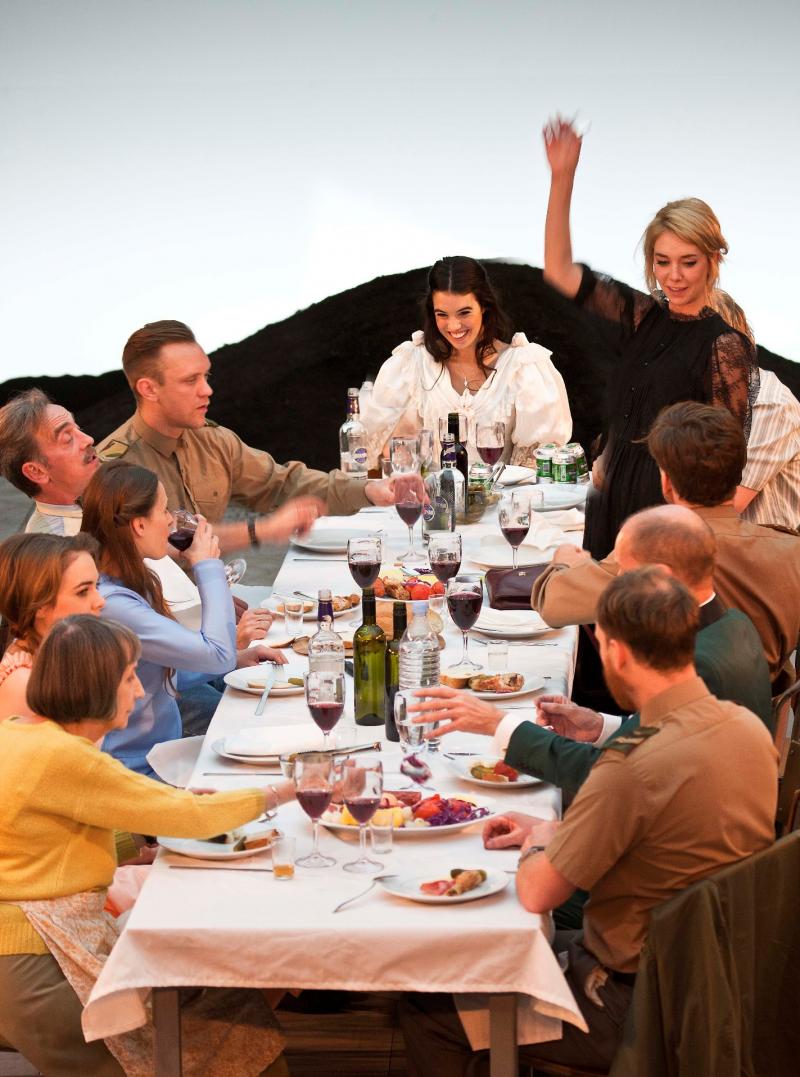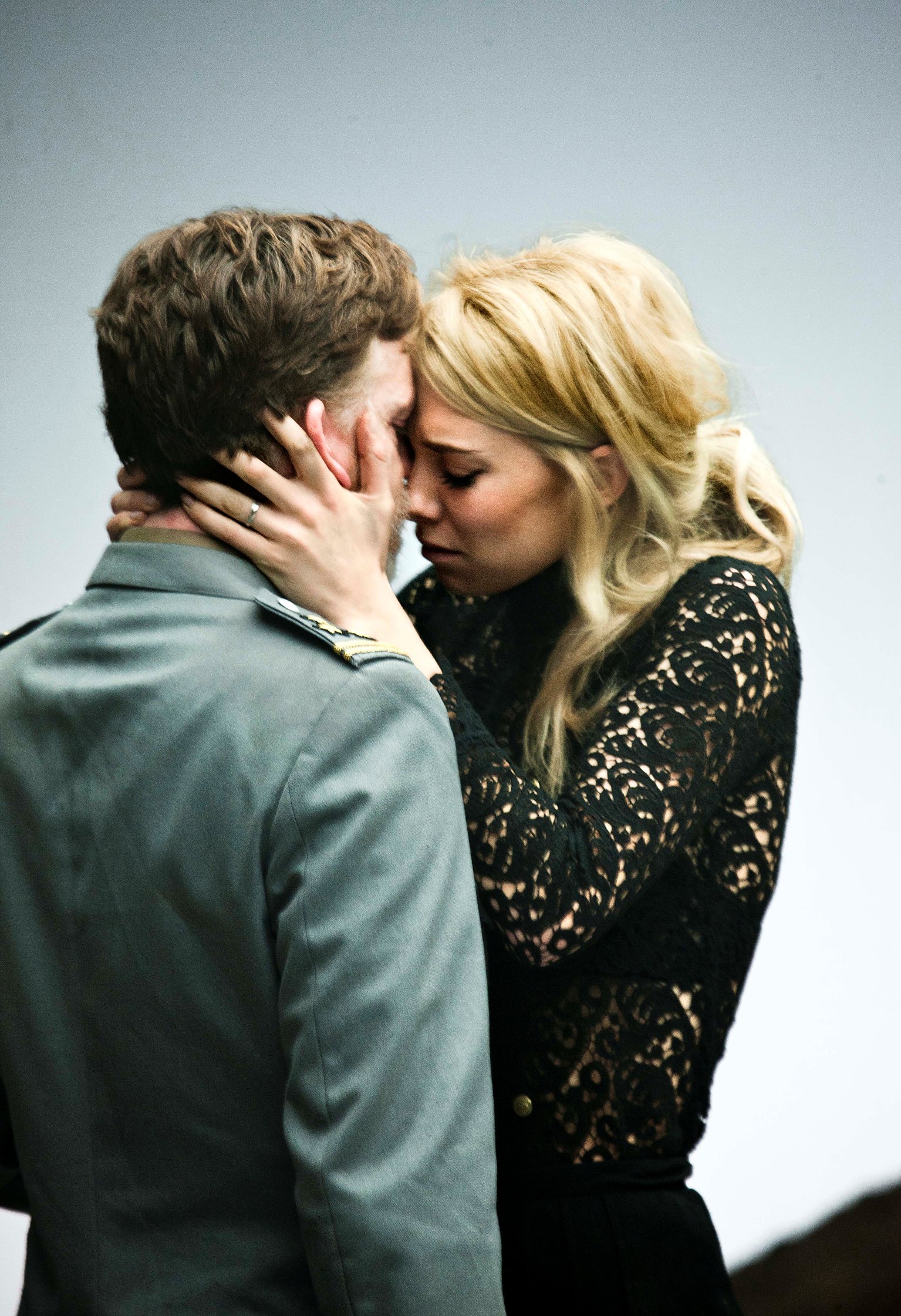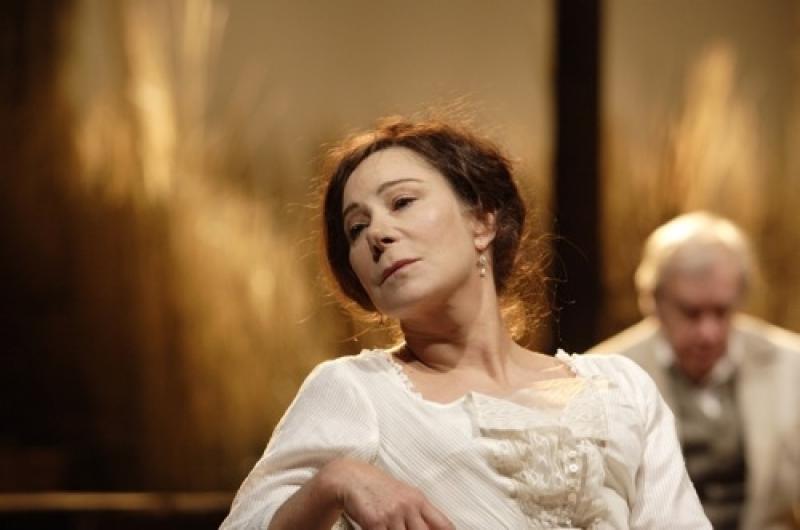Three Sisters, Young Vic | reviews, news & interviews
Three Sisters, Young Vic
Three Sisters, Young Vic
Benedict Andrews' energetic update is stronger on ensemble work than individual performances

Updating Chekhov is nothing new, despite the preliminary flurries about this production. Yet the singular directorial take can only highlight the master’s modernity in the bigger issues. If Australian iconoclast Benedict Andrews had continued as he seems to begin, with a Stanislavsky-like realism for today, passing anachronisms like the optimism for a better life in centuries to come, the idleness of a servanted household and a shockingly abrupt duel might jar.
The teamwork fluidly directed by Andrews certainly carries the text he has adapted from Helen Rappaport’s working translation. There’s no dislocation between authentic Chekhovian meditations on the meaning of life and work on the one hand and the healthy peppering of "fucks" which convey the frustrations of Masha and her brother Andrey. A pertinent Bowie refrain, "Golden Years" as symbol of Masha’s yearning, and a convincingly spontaneous group rendition of Kurt Cobain’s "Smells like Teen Spirit" on the night of the carnival sit easily alongside sentimental piano turns and Chebutykin’s authentic "Ta ra ra boom de-ay" in Act Four. Paul Arditti’s soundscape adds immeasurably to the atmosphere, not least in the wind howling round the house and the threatening low-level hum of helicopters as the regiment leaves town.
Movement is so free and easy in the first two acts, the hope for something better so vibrant, that you almost overlook the sisters’ physical distance from one another across the vasts of grey tables that represent the floor of the Prozorov house in Johannes Schütz’s chilly design. As the tables are slowly removed during the catalytic night of the town fire in Act Three, the women are forced closer even as they begin to feel their isolation the more, ending up huddled together on the earth mound at the back wall of the acting space.
 Their very different characters are deftly suggested at the start: Mariah Gale’s Olga, the sensible teacher – with one comic moment when she turns up inside a bear suit on carnival night - Vanessa Kirby mannered and nervy as glam-in-black Masha, beautiful newcomer Gala Gordon an ingénue Irina whose enthusiasms ring fresh and true. That they remain a little one-dimensional in the later crises, emoting without quite plumbing the depths, is mitigated by strengths elsewhere in a cast with few weak links; only Michael Feast’s Chebutykin overplays his hand in a barely intelligible drunken binge. Emily Barclay lights up the stage as the gauche Natasha, a tattooed Aussie wrapped up in a green ribbon, who turns into a domestic monster wreaking revenge on the condescension of her husband’s sisters. Danny Kirrane’s Andrey, the brother of promise gone to seed in a tracksuit pushing a pram around the stage, and Sam Troughton’s vigorous Tuzenbach find more pathos in their endgames than the actresses.
Their very different characters are deftly suggested at the start: Mariah Gale’s Olga, the sensible teacher – with one comic moment when she turns up inside a bear suit on carnival night - Vanessa Kirby mannered and nervy as glam-in-black Masha, beautiful newcomer Gala Gordon an ingénue Irina whose enthusiasms ring fresh and true. That they remain a little one-dimensional in the later crises, emoting without quite plumbing the depths, is mitigated by strengths elsewhere in a cast with few weak links; only Michael Feast’s Chebutykin overplays his hand in a barely intelligible drunken binge. Emily Barclay lights up the stage as the gauche Natasha, a tattooed Aussie wrapped up in a green ribbon, who turns into a domestic monster wreaking revenge on the condescension of her husband’s sisters. Danny Kirrane’s Andrey, the brother of promise gone to seed in a tracksuit pushing a pram around the stage, and Sam Troughton’s vigorous Tuzenbach find more pathos in their endgames than the actresses.
William Houston brings sonorous modulations to Lieutenant-Colonel Vershinin’s art of philosophy as seduction, even if the fast-developing relationship with Kirby’s Masha (pictured above) feels less than central. But then the last time it did, in the Moscow Sovremennik Theatre Company’s visit to London, the rest of the cast lagged well behind the ill-fated couple, and that you could never say of this team. The outcome may be less than heartbreaking, but Andrewsis sure enough of Chekhov’s trajectory to sweep his actors vigorously along with him.
MORE CHEKHOV ON THEARTSDESK
The Cherry Orchard, National Theatre (2011). Zoë Wanamaker (pictured below) shines in Howard Davies's murky production of Chekhov
The Cherry Orchard, Sovremennik, Noël Coward Theatre (2011). Russians soar in third, and final, offering of their first-ever London season
Uncle Vanya, The Print Room (2012). Iain Glen stars in a version of Chekhov at his most tenderly intimate
A Provincial Life, National Theatre Wales (2012). Moments of visual beauty punctuate a Chekhov adaptation that struggles to find its focus
 Uncle Vanya, Vakhtangov Theatre Company (2012). Anti-naturalistic Russian Chekhov buries humanity under burlesque and mannerism
Uncle Vanya, Vakhtangov Theatre Company (2012). Anti-naturalistic Russian Chekhov buries humanity under burlesque and mannerism
Uncle Vanya, Vaudeville Theatre. Anna Friel, Laura Carmichael and Ken Stott shine bright in Lindsay Posner's production of Chekhov's drama
Longing, Hampstead Theatre (2013). William Boyd's dramatisation of two Chekhov stories with Iain Glen and Tamsin Greig is more pleasant than towering
The Cherry Orchard, Young Vic (2014). Katie Mitchell delivers Chekhov's masterpiece with devastating power
Uncle Vanya/Three Sisters, Wyndham's Theatre (2014). Quiet truth in finely observed ensemble Chekhov from the Mossovet State Academic Theatre
Winter Sleep. Turkish master Nuri Bilge Ceylan’s Cannes Palme d'Or winner, based on Chekhov short stories, is huge in every sense
The Seagull, Regent's Park Open Air Theatre (2015). Strikingly staged Chekhov continues a strong season in the park
Uncle Vanya, Almeida Theatre (2016). Robert Icke's lengthy revival/reappraisal is largely a knockout
Young Chekhov, National Theatre (2016). Jonathan Kent's three-play Chekhovathon builds to a shattering climax
Wild Honey, Hampstead Theatre (2016). Early Chekhov begins strongly then falls away
The future of Arts Journalism
You can stop theartsdesk.com closing!
We urgently need financing to survive. Our fundraising drive has thus far raised £49,000 but we need to reach £100,000 or we will be forced to close. Please contribute here: https://gofund.me/c3f6033d
And if you can forward this information to anyone who might assist, we’d be grateful.

Subscribe to theartsdesk.com
Thank you for continuing to read our work on theartsdesk.com. For unlimited access to every article in its entirety, including our archive of more than 15,000 pieces, we're asking for £5 per month or £40 per year. We feel it's a very good deal, and hope you do too.
To take a subscription now simply click here.
And if you're looking for that extra gift for a friend or family member, why not treat them to a theartsdesk.com gift subscription?
more Theatre
 The Producers, Garrick Theatre review - Ve haf vays of making you laugh
You probably know what's coming, but it's such great fun!
The Producers, Garrick Theatre review - Ve haf vays of making you laugh
You probably know what's coming, but it's such great fun!
 Not Your Superwoman, Bush Theatre review - powerful tribute to the plight and perseverance of Black women
Golda Rosheuvel and Letitia Wright excel in a super new play
Not Your Superwoman, Bush Theatre review - powerful tribute to the plight and perseverance of Black women
Golda Rosheuvel and Letitia Wright excel in a super new play
 Cow | Deer, Royal Court review - paradox-rich account of non-human life
Experimental work about nature led by Katie Mitchell is both extraordinary and banal
Cow | Deer, Royal Court review - paradox-rich account of non-human life
Experimental work about nature led by Katie Mitchell is both extraordinary and banal
 Deaf Republic, Royal Court review - beautiful images, shame about the words
Staging of Ukrainian-American Ilya Kaminsky’s anti-war poems is too meta-theatrical
Deaf Republic, Royal Court review - beautiful images, shame about the words
Staging of Ukrainian-American Ilya Kaminsky’s anti-war poems is too meta-theatrical
 Laura Benanti: Nobody Cares, Underbelly Boulevard Soho review - Tony winner makes charming, cheeky London debut
Broadway's acclaimed Cinderella, Louise, and Amalia reaches Soho for a welcome one-night stand
Laura Benanti: Nobody Cares, Underbelly Boulevard Soho review - Tony winner makes charming, cheeky London debut
Broadway's acclaimed Cinderella, Louise, and Amalia reaches Soho for a welcome one-night stand
 The Pitchfork Disney, King's Head Theatre review - blazing with dark energy
Thrilling revival of Philip Ridley’s cult classic confirms its legendary status
The Pitchfork Disney, King's Head Theatre review - blazing with dark energy
Thrilling revival of Philip Ridley’s cult classic confirms its legendary status
 Born with Teeth, Wyndham's Theatre review - electric sparring match between Shakespeare and Marlowe
Rival Elizabethan playwrights in an up-to-the-minute encounter
Born with Teeth, Wyndham's Theatre review - electric sparring match between Shakespeare and Marlowe
Rival Elizabethan playwrights in an up-to-the-minute encounter
 Interview, Riverside Studios review - old media vs new in sparky scrap between generations
Robert Sean Leonard and Paten Hughes make worthy sparring partners
Interview, Riverside Studios review - old media vs new in sparky scrap between generations
Robert Sean Leonard and Paten Hughes make worthy sparring partners
 Fat Ham, RSC, Stratford review - it's Hamlet Jim, but not as we know it
An entertaining, positive and contemporary blast!
Fat Ham, RSC, Stratford review - it's Hamlet Jim, but not as we know it
An entertaining, positive and contemporary blast!
 Juniper Blood, Donmar Warehouse review - where ideas and ideals rule the roost
Mike Bartlett’s new state-of-the-agricultural-nation play is beautifully performed
Juniper Blood, Donmar Warehouse review - where ideas and ideals rule the roost
Mike Bartlett’s new state-of-the-agricultural-nation play is beautifully performed
 The Gathered Leaves, Park Theatre review - dated script lifted by nuanced characterisation
The actors skilfully evoke the claustrophobia of family members trying to fake togetherness
The Gathered Leaves, Park Theatre review - dated script lifted by nuanced characterisation
The actors skilfully evoke the claustrophobia of family members trying to fake togetherness
 As You Like It: A Radical Retelling, Edinburgh International Festival 2025 review - breathtakingly audacious, deeply shocking
A cunning ruse leaves audiences facing their own privilege and complicity in Cliff Cardinal's bold theatrical creation
As You Like It: A Radical Retelling, Edinburgh International Festival 2025 review - breathtakingly audacious, deeply shocking
A cunning ruse leaves audiences facing their own privilege and complicity in Cliff Cardinal's bold theatrical creation

Add comment